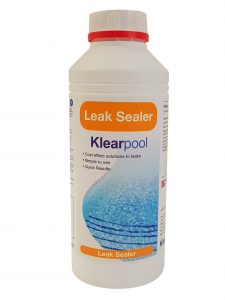Is your swimming pool losing water?
One of the most frustrating headaches with swimming pool ownership is when you see the water level suddenly start to drop, your mind goes into overdrive and you start to panic.
All is not lost if your swimming pool pipework is leaking as Klearpool Leak Sealer could be the solution to your problem, an inexpensive answer which could save you a lot of money with repair bills to pipework.
The reasons your swimming pool is suddenly leaking are varied. Dry summers see the water table drop which puts pressure on the pipework which can result in leaks of pipework and associated fixings can become brittle after years of use and the general degrading of older plastics. Klearpool Leak Sealer works in a revolutionary way, when the product is added to water and circulates around the swimming pool it reacts to air in the pipework (where there is a leak) and dries to form a solid airtight seal; just like magic!
There are key instructions and directions when using Klearpool Leak Sealer, such as ensuring filtration is set to recirculate, so always read the label for the correct application.
If you own a concrete / tiled swimming pool another factor you’ll need to consider is “soft water”. Areas such as Cornwall and Devon and large parts of Scotland, Wales and the North of England enjoy soft water but this can cause issues for owners of tiled swimming pools. It’s critical to ensure calcium levels of the swimming pool water is above 250 PPM (parts per million) readings below this level can see the water satisfy its appetite for calcium by leaching from grout and concrete surfaces and thus causing long term damage to the fabric of the swimming pool.
To avoid this problem:
• Check the water weekly to ensure calcium levels are higher than 250 PPM, use an OPC Mini Hardness Test Kit or Palintest 6 in 1 Test Strips
• Check your mains water supply to ascertain what the in-coming reading is on the supply water. If its below 250 PPM the chances are you have soft water. Use the OPC Mini Hardness Test Kit or Palintest 6 in 1 Test Strips to determine the calcium hardness readings
• If calcium levels are low add OPC Hardness Plus
By following these simple steps you will help ensure the integrity of your swimming pool for many years to come.
*Use biocides safely. Always read the label and product information before use.

